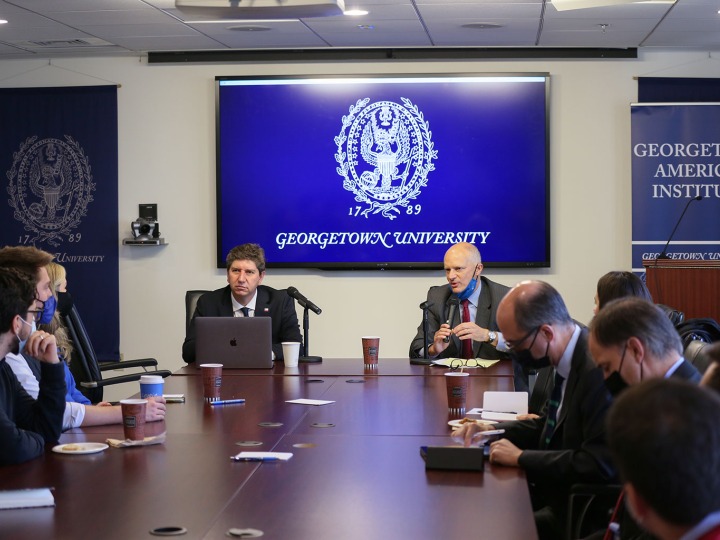Chilean Finance Minister Rodrigo Cerda Discusses Chile’s Economy and Social Challenges amid the COVID-19 Pandemic
In a November 16 event, Rodrigo Cerda, finance minister of Chile, spoke about Chile’s fiscal policy and the challenges that lie ahead in light of the social unrest from 2019 and the COVID-19 pandemic.

Over the last couple of years, Chile has experienced two negative shocks that have impacted its political and economic situation: social unrest that began in October 2019 and the COVID-19 pandemic. In a presentation co-sponsored by the Georgetown Americas Institute, Georgetown Global Economic Challenges Network, Georgetown Center for Economic Research, and Solvay Brussels School of Economics and Management (Université Libre de Bruxelles), Cerda began by noting that the social unrest has led to conversations within the government about a new constitution.
“One of the good things in Chile is that we solve problems in a peaceful and democratic way,” he said. “This will be an opportunity for [the government] because if we have a good constitution, we will likely have stable rules for the next 30-40 years.”
Addressing Economic Uncertainty
Cerda noted that the Chilean government began to provide fiscal transfers in June 2020 that have benefitted nearly 90% of the population during the pandemic. Chile was also one of the first countries in Latin America to begin vaccination for COVID-19. Surprisingly, the Chilean economy has grown nearly 12% so far in 2021 and stands at 8% above pre-pandemic levels.
Concurrently, polarization in the Chilean Congress and the social unrest has contributed to economic policy uncertainty. “Politics are very relevant for economic outlook,” Cerda said. “The upcoming general elections [on November 21] will be crucial because the new composition of Congress will be very relevant for the future of political discussion in Chile.”
Part of this uncertainty has led to an increase in interest rates and inflation in Chile over the last two years. Cerda acknowledged that the pandemic resulted in the loss of nearly 2 million jobs and a need to restore Chile’s macroeconomic balance. However, he remains optimistic about the future of the Chilean economy, noting that the country has nearly 30 free-trade agreements that reach roughly 90% of global GDP.
When we compare this with other countries in Latin America, Chile is one of the safest countries with least risk. If we can address the social unrest through talks about the new constitution and more dialogue in Congress, we will be at a good point to have a good economy and society.

Alejandro Werner, who will join the Georgetown Americas Institute as founding director in January 2022, questioned whether Chile’s fiscal policy could be a model for other countries in Latin America. Cerda answered that social unrest was partially the result of fiscal policy focused on poorer households while neglecting the middle class. “We realized that our middle class was growing, and we were not changing our policies fast enough to adjust,” he said.
Cerda warned that this does not mean that Chile should try and solve all of its problems at once. “The historic ‘Chilean way’ of solving problems is that previous administrations have tried to address one social problem at a time,” he said. “The recent social unrest has brought the notion that you need to solve everything fast, which is very difficult to do.”
Investing in Education
Micael Castanheira, professor of economics at the Solvay Brussels School of Economics and Management, asked whether government intervention in Chile is mainly about redistribution or investment in private sectors. Using education in Chile as an example, Cerda noted that the government has invested a significant amount in free public universities, but not as much in primary and secondary education.
“We have good education in Chile in the private sector, but the coverage of the private sector is very low,” he said. “One of the things we have learned from the social unrest is that people want more redistribution.”
According to Cerda, this emphasis on redistribution means that the new constitution in Chile will likely have more social rights.
If we can solve problems in a democratic way where people can participate, that will be best. What we see at the moment is that politics is at the heart of our society. Chile has a long way to go, but we have very good grounds for the future.
